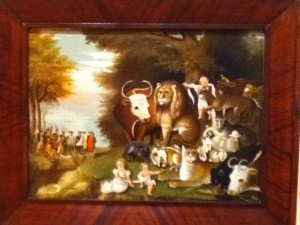The Blog
What exactly is folk art?
Last weekend when I was on a tour at the Abby Aldrich Rockefeller Folk Art Museum in Williamsburg,Va., a guide asked me if I knew what folk art is. I’m an antiques collector, and I’ve seen a lot of what I thought was folk art, but I don’t have an exact definition. The guide suggested that folk art is created by artists who don’t have any formal training in art. Consequently, she said, most folk art paintings lack perspective or at best have very primitive use of perspective, such as outlines.
As an example, she pointed out the dark spots beneath the children’s hands in one of Edward Hicks’ versions of “The Peaceable Kingdom.” The painting she was talking about, which hangs in the museum, is shown above. The dark spots are supposed to be holes in the ground, but they look more like small balls.
I was intrigued by her definition of folk art, and I couldn’t help drawing a parallel between folk art and what might be considered folk writing. If a writer has no formal training—no workshops and no MFA—is he or she a folk writer? Does the fact that a folk writer has no formal writing education mean that he or she is less likely to use the more subtle techniques of the craft, like foreshadowing and parallelism? Is it possible for a writer who can’t formally define foreshadowing to include it in a story or novel? What about irony, that most slippery of devices?
I think it is possible for somebody who’s attuned to such things to read enough sophisticated literature to be able to write it. Probably it’s also true that visual artists can move beyond the folk stage, but do they ever lose that label? We hope that with each revision of a story, the writing improves. The same should be true for a painting. Hicks painted 61 versions of “The Peaceable Kingdom.” Our guide at the Rockefeller museum said that his renderings of the children and animals in these paintings became more subtle as the years went by.
So can practice and experience take the place of education in the arts? I don’t know. But I want to think so. I’m not spurning education. But I believe there’s no substitute for hard work. And I’m glad we don’t have a title like “folk writer” for writers who can’t—or don’t—go to writing school.
Tags: Art, Folk Art, writing
Get in Touch
Follow on Facebook
Follow on Twitter
___________________________________________________
Website Design by Eliza Whitney
 Posts from Late Last Night Books
Posts from Late Last Night Books




